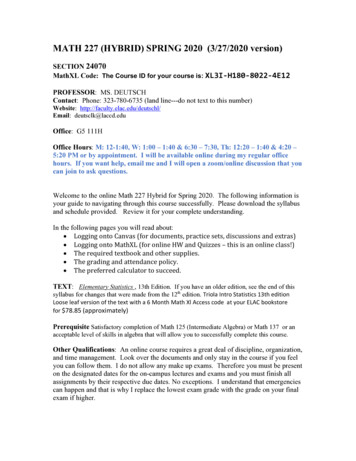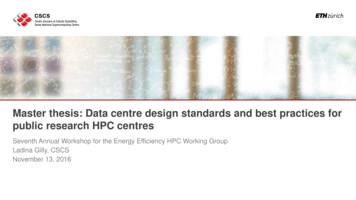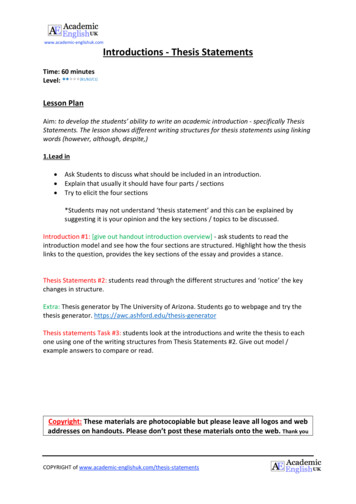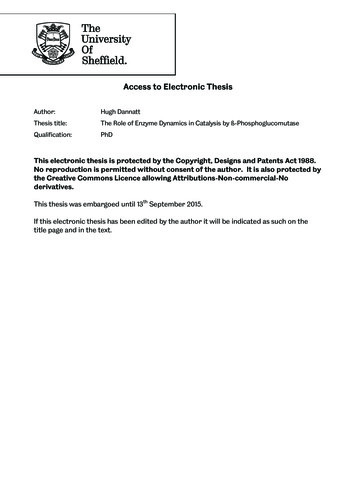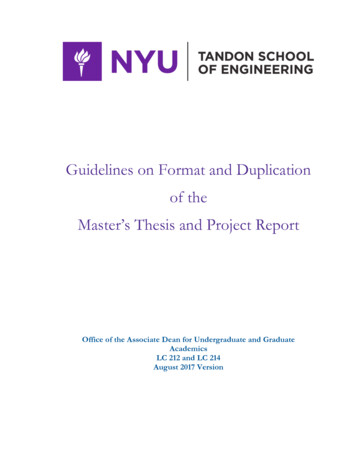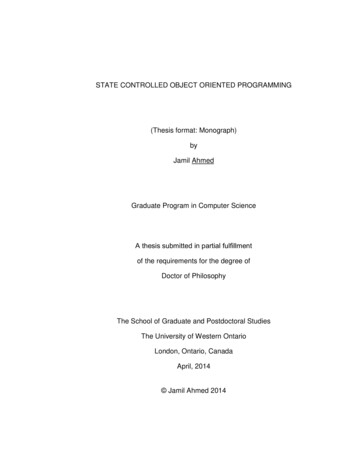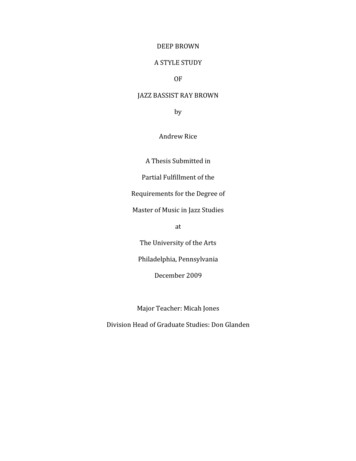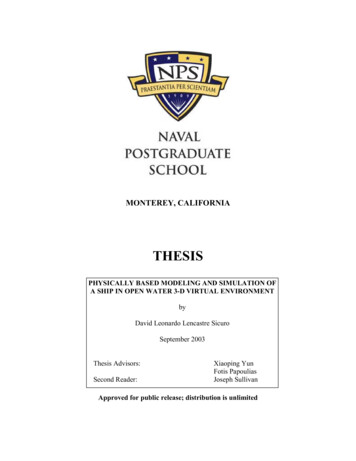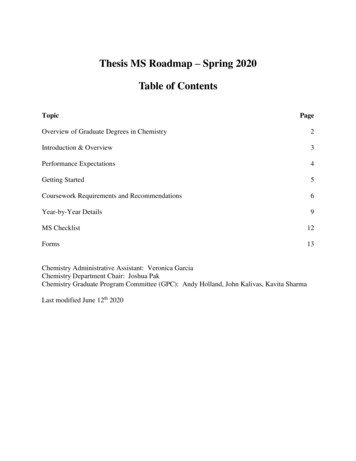
Transcription
Thesis MS Roadmap – Spring 2020Table of ContentsTopicPageOverview of Graduate Degrees in Chemistry2Introduction & Overview3Performance Expectations4Getting Started5Coursework Requirements and Recommendations6Year-by-Year Details9MS Checklist12Forms13Chemistry Administrative Assistant: Veronica GarciaChemistry Department Chair: Joshua PakChemistry Graduate Program Committee (GPC): Andy Holland, John Kalivas, Kavita SharmaLast modified June 12th 2020
Graduate Degrees in the Department of ChemistryThe Chemistry department offers three different graduate programs, each intended to serve adifferent type of student. Although these degrees all include the letters “MS” and all require 30credits of graduate coursework including 15 6600-level credits focused in chemistry, each carriesa unique set of privileges and expectations, and students should not expect to freely switchbetween them after starting one program. In particular, BS/MS students will be asked to reapplyto the graduate school if they wish to move to either standalone MS program.The Thesis MS is a two-year research-centered degree. While it requires significant coursework,this program emphasizes year-round laboratory research, including one summer, and culminatesin the writing of an original thesis. At the close of the program, each student presents anddefends their thesis. Thesis MS students are fully eligible to receive research or teachingassistantships to help compensate them for the program’s substantial time commitments.The Non-Thesis MS is a two-year coursework-centered degree. This track requires asignificantly larger number of traditional courses, and only 4 credits of research (and no thesiscredits) may be counted towards its requirements. The program concludes with written and oralexams on selected coursework subjects. While Non-Thesis MS students may choose to take onteaching assignments on a course-by-course basis, they are less likely than Thesis MS students toreceive full-time teaching assistantships.The BS/MS is an accelerated three-year program enabling undergraduate students to earn MSdegrees in one additional year beyond the undergraduate degree by pursuing full-time summerresearch for two summers and beginning MS coursework before completing their undergraduatedegrees. This program is intended for ambitious students seeking to deepen their engagementwith chemistry as undergraduates, and to quickly burnish their credentials for applying to jobs orcompetitive PhD programs. The program concludes with the composition and defense of aresearch paper similar to a thesis. BS/MS students are fully eligible, like Thesis MS students, toreceive research and teaching assistantships during all three years of the program.FundingA limited number of teaching assistantships, which award a full tuition waiver and stipend tostudents fulfilling three teaching assignments each semester, are awarded for the following yeareach April. To apply for consideration, a student should submit a brief personal statement, theirtranscript, and letters of reference ideally from current teaching and research supervisors.Research assistantships may also be available by arrangement with individual faculty.Department-funded MS students must obtain permission from the GPC to maintain a nonuniversity job during the first semester in the program. Thereafter, permission must be obtainedfrom a student’s research committee. Additional employment by the University also requirespermission from the Dean of the Graduate School.2 / 19
Introduction to the Thesis MS Candidate Road MapThis document outlines the procedural steps required for successful completion of a Thesis MSdegree in chemistry. The road map also describes your obligations in the MS program anddepartmental expectations of your performance. It is your responsibility to ensure that you aremeeting all deadlines as you progress through the program. A checklist of deadlines is providedon page 12 of this document.Please note that this is an advisory document that is meant to assist your planning, rather than todefine official university policy. For the authoritative version of all official policy definitionsplease see the ISU Graduate Catalog.The following is a brief overview of the steps required to earn your degree.Year One:FallPlan an initial program of study to satisfy course requirements, satisfy anyremaining undergraduate prerequisites and/or GRE requirements, choose aresearch advisor and research committee, and write a research project overviewand research contract.SpringBegin research project, and give a literature seminar in CHEM 6601.SummerContinue research project full time for at least 10 weeks, and write a first-yearresearch report.Year Two:FallSubmit the Final Program of Study to the Graduate School, and apply forgraduation with an MS degree.SpringWrite your thesis, enrolling in CHEM 6650 for at least 6 credits. Schedule an oralexam for at least three weeks prior to graduation, and notify the Graduate Schoolat least two weeks in advance of the exam. Provide your research committeemembers with an essentially complete thesis at least two weeks before the exam,present your research in CHEM 6601, and defend your thesis.3 / 19
Performance ExpectationsYou are required to maintain good academic standing in the MS program. This is accomplishedby meeting Departmental, University, and Graduate School requirements as outlined below andin the Graduate Catalog, and by fulfilling the research contract you devise with your advisor.Specifically, the requirements for good standing include but are not limited to: Maintaining a minimum overall graduate GPA of 3.0Receiving no more than two grades below B– in graduate coursesProgressing on your research project each and every semesterSubmitting required paperwork in a timely mannerMeeting all responsibilities outlined in your research contract and/or teaching assignmentAttending department seminars and local symposia when possibleFailure to maintain good standing could result in dismissal from the MS program or revocationof departmental funding. These consequences are decided by the Chemistry Department Chairupon recommendation from the Graduate Programs Committee (GPC). If you are receivingfunding, that funding is typically guaranteed only upon satisfactory progress and good standing,and only for the term initially indicated (usually one or two years). A degree will be awardedafter that time only if satisfactory research and coursework has been completed. Continuation offunding after that time will be subject to the approval of the GPC.You are expected to attend all seminars sponsored by the Chemistry Department whether or notyou are enrolled in the seminar course. Chemistry seminars are generally held on Fridayafternoons at 1:00 PM. If you have unavoidable course or teaching assignment conflicts, you areexcused.Department-funded MS students are given various teaching assignments which typically includesupervising laboratory sections and providing grading assistance. You are expected to meet allobligations of your assigned duties, including: Be present, punctual, and prepared at all meetings scheduled by your teaching supervisor.Complete grading on the schedule set by your supervisor.Deliver laboratory instruction and complete grading according to the standards set byyour supervisor, prioritizing student safety and learning.Be professional and respectful in all interactions with students.Department-funded MS students must obtain permission from the GPC in order to maintain anon-university job during the first semester in the program. Thereafter, permission must beobtained from your respective research committee. Additional employment by the Universityalso requires permission from the Dean of the Graduate School.4 / 19
Getting Started1.If you are funded by the department, you must pick up a check for tuition and fees atregistration during each fall, spring, and summer session. This check must then be signedand turned in at registration. Failure to do so will result in late fees payable by you. Inorder to receive payment of your stipend, you must go to the personnel office in theAdministration Building and fill out a few forms when you arrive on campus for the startof the fall semester. You may contact the chemistry administrative assistant for details.2.If you have teaching responsibilities, be sure to contact the instructor to whom you areassigned, and to make fulfillment of these responsibilities your highest priority. If you arefunded by a research assistantship, you should already be establishing formal researchresponsibilities with your advisor.3.If you have not already selected a research project, make appointments with faculty todiscuss their research interests. Come to an agreement with one faculty member withwhom you will do research, and who will serve as your advisor for the course of yourdegree program and as the chair of your graduate committee. You should do this asquickly as possible so that you can begin your research project.4.With the aid of your advisor, devise an initial program of study that satisfies therequirements below and your advisory committee. This program should include promptfulfillment of any preconditions on your admission, such as completion of pre-requisitecourses or satisfactory performance on the GRE.5.You must form a research committee consisting of your advisor and two other members.One of the members should ideally be from another discipline within the chemistrydepartment (analytical, inorganic, organic, physical, or biochem). The third member mustbe from another department and will act as your Graduate Faculty Representative, orGFR. The GFR may be involved in your research as a collaborator, but it is importantthat at least one member of your committee be sufficiently independent and disinterestedin your research that you trust them to mediate any conflicts that arise with youradvisor(s). After you have formed your research committee, please fill out the ResearchCommittee Form, collect the signatures indicated (the Department Chair should sign last)and return it to the GPC by November 1. If you have no preference for a specific GFR,the role can be assigned later.6.Write an overview of your research project briefly introducing its subject, and definingthe specific objectives you intend to achieve in completing your degree. At the sametime, you and your advisor should compose a research contract outlining your researchresponsibilities (hours in the lab, lab upkeep duties) and any research progressbenchmarks you are expected to meet (document drafts, research presentations). Eachdocument should be signed by your research committee and submitted to your advisor byDecember 15 / 19
Courses Required for Admission to the MS ProgramYou are expected to have completed the following courses before beginning the MS program. Ifyou are missing any of them, you should discuss this with the chemistry department chair or yourresearch advisor as soon as possible, and plan to complete them as early as possible in 1,3352117011752211,22122213,2214General Chemistry I and IIInorganic Chemistry I and LabQuantitative Analysis and LabOrganic Chemistry I and IIOrganic Chemistry Laboratory I and IIPhysical ChemistryCalculus ICalculus IIEngineering Physics I and IIEngineering Physics I and II Laboratory9446264482crcrcrcrcrcrcrcrcrcrIf you have been granted conditional admittance without yet fulfilling the Graduate School’sGRE and/or TOEFL requirements, you must achieve the required test scores or otherwise meetyour conditions prior to filing for graduation, and should seek to do so as soon as possible afteryou begin the program.Requirements for Completion of the MS ProgramThe core curriculum of the typical program is composed of research and the four graduate leveladvanced chemistry courses (CHEM 6609, CHEM 6630, CHEM 6655, and CHEM 6671). Notethat only one of these courses is offered each semester, so you will only have one opportunity totake each class in a two-year schedule. Additionally, some of these courses have prerequisites inaddition to the admission requirements listed above, which must be completed but might notthemselves count toward graduate elective requirements – consider this when planning yourschedule. At least one of the core courses is required, and all four are recommended. The balanceof coursework requirements comprises seminar (CHEM 6601) and graduate electives inchemistry or in related disciplines specific to a student’s focus of study.The degree requires credits for thesis writing (CHEM 6650), and terminates in a thesispresentation and defense. Students may also count up to 12 credits of research, CHEM 6635,toward their degree requirements.A minimum of 30 graduate credits is required for all degree options, although a larger number ofcredits (9 graduate credits during Fall and Spring semesters) will be required to maintain fulltime standing. Summer enrollment is also required in order to complete the research expectationsof the thesis degree and meet the institutional continuous registration requirement for graduatestudents.Note that although these are the official minimum requirements, every program of study must bespecifically approved by your advisory committee and signed by the Department Chair.Typically, thesis students are expected to complete at least five total lecture courses.6 / 19
1 of CHEM 6609CHEM 6630CHEM 6655CHEM 6671CHEM 6601CHEM 665066XX Lecture Electives*55XX/66XX Electives*3 cr26613crcrcrcr 4 more cr count as electivesmay include 12 cr CHEM 6635*Graduate Electives may be courses in CHEM or related disciplines, typically in the College ofScience and Engineering or the College of Pharmacy. These classes should be selected inconsultation with your advisor and must be approved by your advisory committee.7 / 19
Recommended Schedule for Thesis DegreeThe following schedule of coursework is recommended for students intending to maintain fulltime status, although some courses may be replaced by graduate electives. Be sure to consultwith your advisor if you wish to deviate from the courses outlined below. The sequence ofadvanced chemistry courses CHEM 6609, 6630, 6655, and 6671 will vary depending on the yearyou enroll.First Year FallCHEM 6630XXXX XXXXXXXX XXXXAdvanced Analytical ChemistryGraduate Coursework ElectiveGrad Elective / Prereq Completion3 cr3 cr3 crAdvanced Physical ChemistryMaster’s ResearchSeminar (Literature Presentation)Graduate Coursework Elective3213First Year erCHEM 6635Master's Research1-6 crSecond Year FallCHEM 6671CHEM 6635CHEM 6650Advanced Organic ChemistryMaster's ResearchThesis3 cr4 cr2 crSeminar (Research Presentation)Advanced Inorganic ChemistryThesis1 cr3 cr5 crSecond Year SpringCHEM 6601CHEM 6609CHEM 6650TOTAL: 37-42 cr8 / 19
Year One of the Thesis MS ProgramYou are strongly encouraged, upon entering the program, to design with an advisor a detailedprogram of study specifying when you will complete the required coursework. Courserequirements are listed above. At least 30 graduate credits are required, including at least 156600-level CHEM credits. Because some courses are offered only once every two years, and youmay need to first complete prerequisites, it is important to begin the required courseworkimmediately. To fill out a full-time schedule you are encouraged to take one or two coursesoutside the department, although research activities may also fill these credits. Keep in mind thatyour curriculum must be approved by your advisory committee and signed by the DepartmentChair, and you should not register for excessive research credits without prior approval.By November 1st, you must select a research committee of three members:Research Committee:Chair (Research Advisor) – supervises your research on a day-today basis and serves as your primary academic advisor.Chemistry Representative – Chemistry faculty ideally fromoutside your discipline (organic, inorganic, analytical, physical,biological).Graduate Faculty Representative (GFR) – faculty member fromoutside the department. The GFR is the Graduate School'srepresentative and is responsible for ensuring fairness, andpotentially an outside arbiter if you have a dispute with youradvisor.The research committee will endorse your satisfactory completion of various requirements in thedegree program, and ultimately serves as your examination committee when you defend yourthesis at the end of your final semester. The research advisor should be selected with care, aschanging advisors later in the program may interrupt research progress and delay graduation.Other committee members may be replaced as scheduling dictates. All three members must bemembers of the graduate faculty, who are listed in the Graduate Catalog.As early as possible in your first semester, you should devise an initial program of study thatmeets the course requirements previously described. This must be approved by your advisorycommittee by the end of your first semester.By the end of the fall semester, you must write a brief research overview that describes yourresearch project in one or two pages. Your overview should include an introduction, thesignificance of the research, a description of the experimental work, a list of materials required,and an outline of your specific objectives. The research overview must be approved by yourresearch committee by December 1 of your first semester.In consultation with your advisor, draw up a research contract that outlines your responsibilitiesin the lab and the benchmarks that will define satisfactory progress in your research program.This will typically include discussion of the time you are expected to spend on research, and may9 / 19
also detail your responsibilities in terms of laboratory upkeep. Research benchmarks may takethe form of formal presentations of your work, completion of draft documents, or other periodicprogress reports formal or informal. This document should also be approved by your committeeand filed with your advisor.By April 1st you may apply to receive departmental funding for the following year by submittingto the Chemistry Department a brief personal statement, grades, and letters of reference fromyour research and teaching supervisors. Unless your original offer of funding specificallyexempts you from applying for its renewal, you should plan to submit these materials. Previouslyunfunded students are also considered in this process.The first seminar you present in CHEM 6601, typically in your first Spring semester, should notbe on a topic directly involved with your thesis. Instead, the seminar should be on a researchtopic from the literature that you find interesting.During the spring and summer, you are expected to work vigorously on your research project.You should spend at least 10 weeks of the summer doing research on a full time basis, enrollingin 1-6 credits of Master’s Research (CHEM 6635) with your research advisor as the instructorfor the course. By the end of the summer you should write a report describing your researchprogress to date, and submit it to all members of your graduate committee. Specific requirementsregarding the extent of this report may be part of your research contract.Year Two of the Thesis MS ProgramYou should complete your research project during the second year of the MS program, enrollingin additional credits of CHEM 6635 in the fall. In the spring, you should enroll in CHEM 6650for at least 6 credits.You must submit your Final Program of Study to the Graduate School for evaluation in the Fallsemester. The Graduate School examines your Final Program of Study and you will be informedof any deficiencies that you then need to rectify in the spring semester. Note that you cannotnotify the Graduate School of y
Thesis MS Roadmap – Spring 2020 Table of Contents . The Thesis MS is a two-year research-centered degree. While it requires significant coursework, this program emphasizes year-round laboratory research, including one summer, and culminates in the writing of an original thesis
